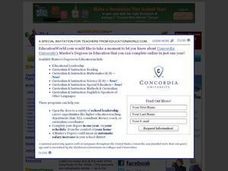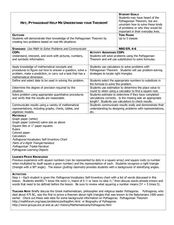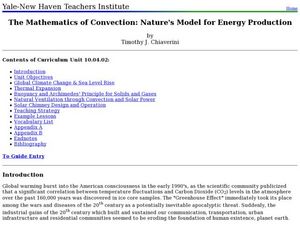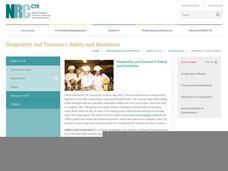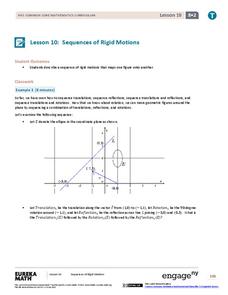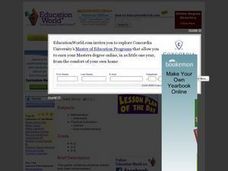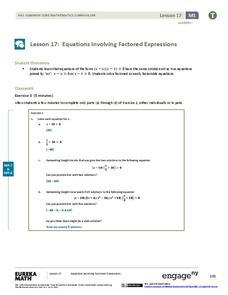State of Michigan
Pre-K Mathematics
Kick-start children's education with this pre-school math unit. Offering 31 different hands-on learning activities that develop young mathematicians' pattern and shape recognition, basic number sense, and much more, this is a must-have...
Curated OER
Gold Rush California and its Diverse Population
Students compare contemporary cultural differences with historical differences based on population percentage. In this cross-curriculum Gold Rush/math lesson plan, students analyze aspects of California's Gold Rush population and...
Curated OER
Hey, Pythagoras! Help Me Understand Your Theorem!
Learners explore the Pythagorean Theorem. In this math lesson, pupils solve problems using the Pythagorean Theorem. They select the appropriate numbers to substitute in the formula to solve problems.
Curated OER
The Mathematics of Convection: Nature's Model for Energy Production
High schoolers conduct a series of experiments to investigate density, buoyancy and climate. In this math lesson, pupils design and build a hot air balloon to demonstrate convection. They research and write a paper about solar chimneys.
Intensive Intervention
Fractions as Numbers
Your learners will enjoy thoroughly understanding fractions, and you will appreciate the abundant, quality resources in this comprehensive unit that builds toward a complete understanding of the concept of fractions as numbers. Many...
National Research Center for Career and Technical Education
Hospitality and Tourism 1: Safety and Sanitation
Math and science come alive in this career-related instructional activity on sanitation. Along the way, learners explore bacterial growth rates using exponential notation and graphs. A link to a very brief, but vivid video shows just how...
EngageNY
Negative Exponents and the Laws of Exponents
Apply the properties of exponents to expressions with negative exponents. The fifth lesson in the series explains the meaning of negative exponents through an exploration of the properties taught in the previous lessons of the series....
EngageNY
Sequences of Rigid Motions
Examine the various rigid transformations and recognize sequences of these transformations. The lesson asks learners to perform sequences of rotations, reflections, and translations. Individuals also describe a sequence that results in...
EngageNY
Angle Sum of a Triangle
Prove the Angle Sum Theorem of a triangle using parallel line and transversal angle relationships. Pupils create a triangle from parallel lines and transversals. They find angle measures to show that the angles of a triangle must total...
EngageNY
Read Expressions in Which Letters Stand for Numbers
Pencil in the resource on writing verbal phrases into your lesson plans. The 15th installment of a 36-part module has scholars write verbal phases for algebraic expressions. They complete a set of problems to solidify this skill.
Curated OER
Balloon Math: A Game for All Levels
Here is a game that combines exercise with math skills. In this mathematics and P.E. lesson, students hold balloons that have a number written on them, and for a set time do not let the balloons hit the ground. They must catch a balloon...
EngageNY
Equations Involving Factored Expressions
Be ready mathematicians of every level. This instructional activity leads to the discovery of the zero product property and provides challenges for early finishers along the way. At conclusion, pupils understand the process of using the...
EngageNY
Definition of Rotation and Basic Properties
Examine the process of rotating images to visualize effects of changes to them. The fifth lesson of 18 prompts pupils to rotate different images to various degrees of rotation. It pays special attention to rotations in multiples of 90...
EngageNY
Some Facts About Graphs of Linear Equations in Two Variables
Develop another way to find the equation of a line. The lesson introduces the procedure to find the equation of a line given two points on the line. Pupils determine the two points from the graph of the line.
EngageNY
Decimal Expansions of Fractions, Part 1
Is it possible to add infinitely long decimals? As pupils complete the examples in the ninth lesson of this 25-part series, they determine that adding these decimals cannot be done without error. Their task is then to determine the size...
EngageNY
More Division Stories
Don't part with a resource on partitive division. Continuing along the lines of the previous lesson plan, pupils create stories for division problems, this time for partitive division problems. Trying out different situations and units...
Curated OER
Button Math
Use buttons, cards, and dice to perform simple math problems! This inventive lesson should be quite engaging for young learners. Kindergarteners use buttons to help them understand the concepts of greater than, less than, and equal to.
Curated OER
Math On the Job
Investigate different types of math required for specific jobs. In this math in occupations activity, use the Internet to research what type of math one might need to know in order to be successful in different jobs. Complete a related...
EngageNY
The Power of Algebra—Finding Primes
Banks are responsible for keeping our financial information safe. Mathematics is what allows them to do just that! Pupils learn the math behind the cryptography that banks rely on. Using polynomial identities, learners reproduce the...
EngageNY
Estimating Quantities
Apply the concept of magnitude to estimate values and compare numbers. The ninth lesson of the 15-part series asks learners to write numbers to their next greatest power of 10 and then make comparisons. Scholars begin to understand the...
EngageNY
Definition of Congruence and Some Basic Properties
Build a definition of congruence from an understanding of rigid transformations. The lesson plan asks pupils to explain congruence through a series of transformations. Properties of congruence emerge as they make comparisons to these...
EngageNY
Solving Equations with Radicals
Show learners how to develop a procedure for solving equations using radicals with the fifth instructional activity of the 25-part module that challenges learners to use properties to solve multi-step quadratic and cubic equations....
Teach Engineering
Bone Density Math and Logarithm Introduction
What do logarithms have to do with bone density? Scholars learn that the equation for bone density includes logarithms. The majority of the third lesson of seven is devoted to logarithms and their properties.
EngageNY
Solving Problems by Finding Equivalent Ratios
Combine total quantities and equivalent ratios in problem solving. The fifth lesson in a series of 29 presents problems that can be solved using equivalent ratios. Pupils use part-to-part ratios and either sums or differences of the...
Other popular searches
- Multicultural Math Lessons
- Dr. Seuss Math Lessons
- Powerpoint Math Lessons
- Thanksgiving Math Lessons
- Esl Lessons Math
- Elementary Math Lessons
- Math Lessons Place Value
- Kindergarten Math Lessons
- 2nd Grade Math Lessons
- Math Lessons Pre Algebra
- Manipulatives Math Lessons
- Halloween Math Lessons



